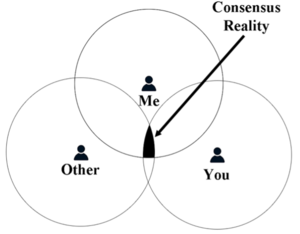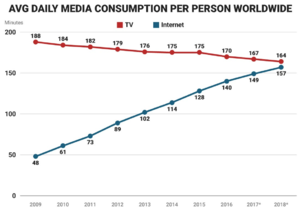Consensus Reality
“You are not a passive receiver of the world. You are an active participant in creating your reality.” - Tim Leary
Consensus reality is the common understanding of facts and truth upheld by a group—be it a community, culture, or society at large. It emerges when enough people agree on “what is,” creating a collective map of reality that governs how they interpret the world around them (see Figure 1).
For much of the modern era, particularly before the internet, consensus reality has been shaped by centralized mass media. Television, radio, and newspapers broadcasted uniform narratives to broad audiences, fostering a relatively stable and unified worldview. Millions tuned into the same programs, heard the same voices, and adopted a common cultural lens.
But that era has passed.
Today, as traditional broadcast models such as TV decline (see Figure 2), we are increasingly living in a fragmented cultural landscape shaped by algorithms, reinforcing echo chambers of personal bias. Information is no longer funnelled through a few institutional gatekeepers. Instead, it’s scattered across social media feeds, niche platforms, and personalized recommendation engines. What was once a coherent cultural narrative has splintered into a mosaic of “reality tunnels”—individualized and often incompatible worldviews shaped by one's personalised digital environment.
This collapse of consensus explains many of our current cultural tensions—from rising political polarization to the growing alienation between people who once shared the same assumptions. The friction isn’t just ideological—it’s perceptual. We are no longer seeing the same world.
And yet, disruption often clears the way for something new, a new kind of shared reality: one that honors pluralism without losing connection.

